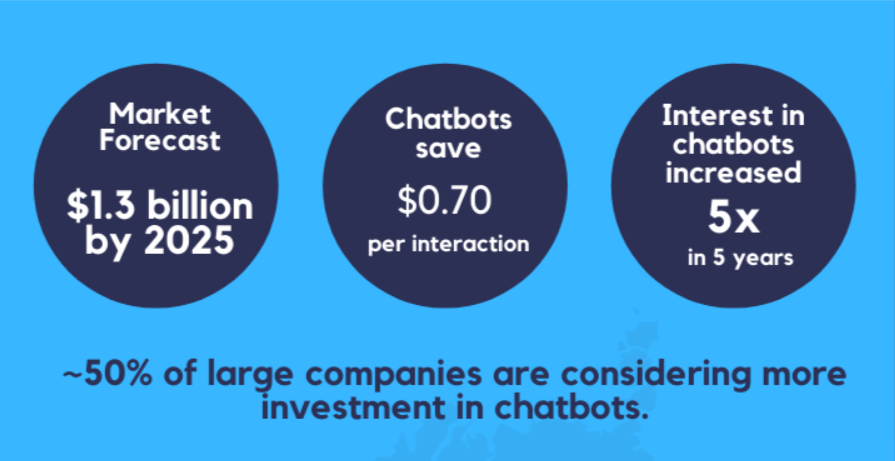According Business Insider, global sales volumes generated by AI chatbots will reach 142 billions dollars by 2024, while chatbots’ market value will reach 1,3 billions dollars by 2025.
Companies interest for this technology grew 5 times in 5 years and 50% of enterprise companies are considering more investments within 2021.

THE AI CHATBOT MARKET: CUSTOMER EXPECTATIONS
More than 50% of clients expect 24/7 customer’s assistance, anyway, 40% of customers do not care if they are being assisted bya bot or a real agent, as long as their question gets answered.
69% of the panel prefers chatbots to get real-time information and in general for customer service inquires; 86% think chatbots should always have an option to transfer to a live agent.
In general, prefer to interact with a bot when thay need fast answers to solve a problem or for purchase information.
47% would by items via chabot and 34% considers bots a fast way to be addressed through a human assistant.
80% of consumers that interacted with a bot report a positive user experience and 27% couldn’t say if they were talking with a bot or a human.
The main benefit that is perceived is a good level of service and user experience.
business results
According to Forbes, business people refer an average sales increase of 67% thanks to chatbots, while 57% reports a large ROI on a minimal investment.
80% of the panel reports measurable improvements in terms of customers’ satisfaction, of service level and contact center performance, while chatbots take care of 80% of recurring customers’ requests.
Consumers and businesses are expected to save over 2.5 billion customer service hours by 2023 and chatbot automation will lead to $23 billion in savings from annual salaries.
industry and business functions data
According to AI Multiple data, the business sectors that benefit most from this technology are: the real estate sector (28%), the travel sector (16%), education (14%), healthcare (10%) and financial sector (5%).
Among business functions: 53% of companies currently use bots in IT, 23% in administration functions, 20% in customer service and 16% in sales and marketing activities.
Chatbots can find application in a variety of business functions, both internal and external, to improve operational efficiency, customer experience and other areas.
For example:
Customer Service: Chatbots can provide customer support, answer frequently asked questions, handle complaints, route inquiries to the appropriate departments, and provide 24/7 support.
Sales and Marketing: Chatbots can be used to capture leads, qualify prospects, provide product or service information, assist with online purchasing, and personalize offers based on customer preferences.
Human Resources: Chatbots can streamline the recruiting process, answer frequently asked employee questions, handle vacation requests, provide information about company benefits, and automate some administrative tasks.
Finance and Accounting: Chatbots can help manage personal or business finances, provide balance sheet information, support in financial transactions and help with expense management.
Technical and IT support: Chatbots can offer technical assistance to resolve common technical problems, provide step-by-step troubleshooting instructions, and support preventative maintenance of systems.
Logistics and supply chain: Chatbots can be used to monitor the supply chain, provide information on the status of shipments, optimize delivery routes and manage inventory.
Training and development: Chatbots can be used to provide interactive training to employees, answer questions during online training courses, and facilitate knowledge sharing within the organization.
E-commerce: Chatbots can assist users with the online shopping experience, recommend products, provide promotion information, and manage payment transactions.
Healthcare: Chatbots can support interaction between patients and doctors, answer health questions, send reminders for medical appointments, and monitor patient well-being.
Hospitality Industry: Chatbots can manage reservations, answer guest questions, provide property information, and gather feedback to improve the hospitality experience.
Banking and finance sector: Chatbots can provide online banking assistance, help with account management, answer questions about financial products and support in banking transactions.
Education sector: Chatbots can be used to answer student questions, provide online learning support, and manage lesson and exam planning.
INTEGRATION WITH GENERATIVE AI
Integration with generative AI has opened up new opportunities in the AI chatbot market, expanding its capabilities and revolutionizing the relationship between companies and their customers.
Generative AI has increased the understanding and dialogue capacity of AI chatbots, but also the market awareness of the potential of this technology.
Generative AI applications like ChatGPT or Google Bard have captured the imagination of people around the world, due to their broad utility and conversational capability.
Their ability to write lyrics, compose music and create digital art has grabbed headlines and convinced individual consumers to experiment and discover more, opening up new opportunities and market scenarios.
Source:
https://www.businessinsider.com/chatbot-market-stats-trends?IR=T
https://research.aimultiple.com/chatbot-stats/
You may also like:

